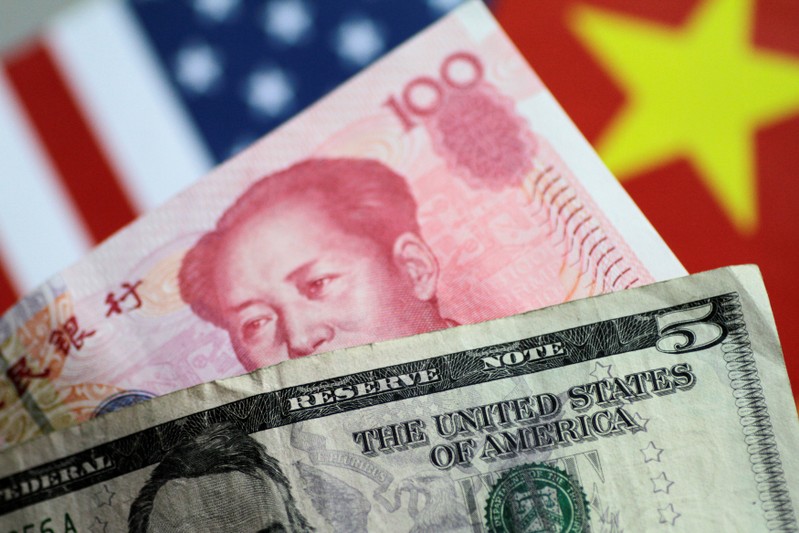
FILE PHOTO: U.S. Dollar and China Yuan notes are seen in this picture illustration June 2, 2017. REUTERS/Thomas White/Illustration
July 8, 2019
SHANGHAI (Reuters) – China’s foreign exchange reserves rose more than expected in June, as growing hopes for a trade war truce with the United States helped ease downward pressure on the yuan currency.
The yuan <CNY=CFXS> has been very sensitive to developments in the year-long Sino-U.S. trade dispute, which has heightened pressure on China’s already slowing economy.
The country’s foreign exchange reserves – the world’s largest – rose $18.23 billion in June to $3.119 trillion, data from the People’s Bank of China (PBOC) showed on Monday.
Economists polled by Reuters had expected the country’s reserves would rise $2 billion from May to $3.103 trillion.
The yuan rose 0.6% against the dollar in June, marking its first monthly gain since February.
The increase in June was due to changes in currency conversion rates and asset prices, the foreign exchange regulator said in a statement after the data release.
The yuan rallied sharply last month on hopes that the leaders of the United States and China would agree to a trade ceasefire while attending a G20 leaders’ summit in Japan. After talks broke down in May, both sides raised tariffs on each others’ goods and Washington had threatened even more.
At the summit, presidents Donald Trump and Xi Jinping agreed to resume trade negotiations, and Trump offered concessions including no new levies and an easing of restrictions on tech giant Huawei [HWT.UL].
While existing tit-for-tat tariffs remain in place, the latest Reuters positioning poll showed that bearish bets on the yuan have more than halved in the last two weeks.
The shift in sentiment attracted foreign investors to Chinese stocks and bonds, providing further support for the yuan. Offshore investors bought Chinese government bonds at the fastest pace so far this year, lifting their holdings of the sovereign debt to a record high.
WEAKER DOLLAR
The yuan, like many other emerging market currencies, has also been buoyed by weakness in the U.S. dollar amid growing expectations the Federal Reserve will start to cut interest rates soon to support the slowing economy.
If the Fed starts lowering rates, some analysts believe the PBOC could soon follow, amid signs China’s economy is continuing to lose momentum. The central bank has already been quietly guiding short-term borrowing rates lower for months.
Early readings on June have been weaker than expected, with factory activity contracting and growth in the service sector softening, business surveys showed, highlighting the need for more stimulus to stabilize the economy.
Analysts forecast China’s second-quarter economic growth slowed further from 6.4 percent in the first quarter. The data will be released on July 15.
Premier Li Keqiang said last week the economy is facing new downward pressure and policymakers will make timely use of cuts in banks’ reserve requirements, stoking market expectations of further policy easing soon.
So far, tough capital controls put in place since the last downturn in 2015-16 have kept outflows largely in check over the past year, despite mounting external and domestic pressure on the economy.
The value of China’s gold reserves jumped to $87.27 billion from $79.83 billion at the end of May.
(Reporting by Stella Qiu in Beijing; Josh Horwitz and Samuel Shen in Shanghai; Editing by Jacqueline Wong and Darren Schuettler)

